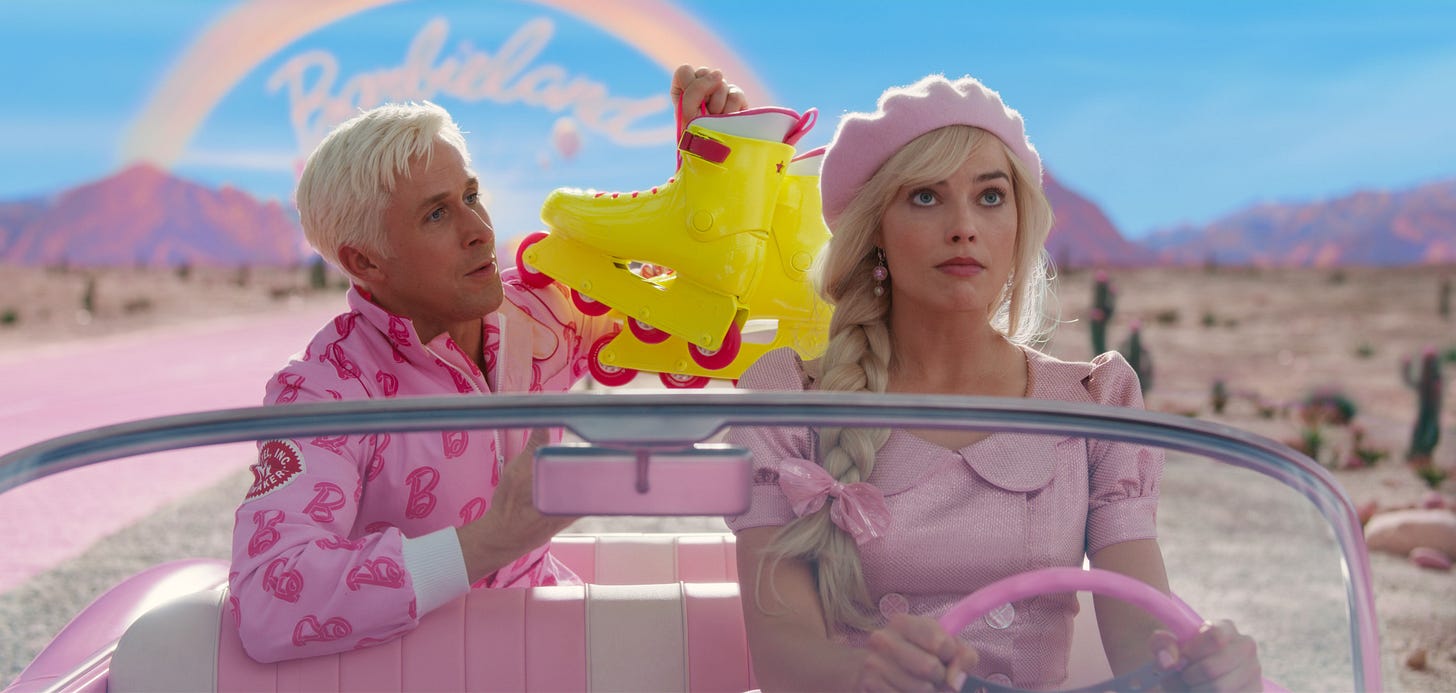"Barbenheimer" Weekend Part I: "Barbie" (⭐ ⭐ ⭐ 1/2)
Greta Gerwig anatomizes the existential crisis of a living doll.
As I was leaving Monday night’s press screening, I turned to the fellow critic walking next to me and mentioned how I thought the movie we’d just seen could easily be interpreted through a lens of Zen Buddhism, as an epic journey through delusion, suffering, and realization all the way to enlightenment. “Funny,” he replied. “I thought of it as a Catholic film. It’s all about grace.”
So, yeah, we were talking about “Barbie” (⭐ ⭐ ⭐ 1/2, in theaters Friday). As with all playthings, the story it tells has a lot to do with the stories you bring to it.
The achievement of Greta Gerwig’s brainy, compassionate, often messy, always exuberant toy story is that it offers an incredibly dense field of inquiry – into gender roles, conformity, female anxiety and male rage (and male anxiety and female rage), consumerism, capitalism, body politics, existential angst, and much, much more – all while remaining a ridiculous amount of fun. This isn’t a “Lego Movie,” where the corporate interests have hired smart filmmakers to snazz up what fundamentally remains a feature-length commercial. Nor is it a work of wink-wink ironic subversion. Instead, “Barbie” is a silly-serious Pilgrim’s Progress through what James Thurber once called The War Between the Sexes, one that extends a comically profound empathy to the living doll at its center, the girls (and boys) who have played with her over the decades, the people they grow up into, and, yes, the men with whom they share the playroom and life’s stage. Even Ken. Sweet, dumb, conflicted Ken.
“Barbie” opens in the live-action universe of Barbieland, parked somewhere just over the rainbow from reality. In Barbieland a multiethnic crew of Barbies runs everything – there’s a Barbie President (Issa Rae), a Barbie Supreme Court, Barbie hardhats. The Kens, by contrast, have one job: The Beach. As was pointed out in Willa Paskin’s excellent New York Times profile of Gerwig this past Sunday, “In the funhouse-mirror world that is Barbieland, Barbies have all the power, and the Kens are their accessories. Not to put too fine a point on it, but: Kens are the women of Barbieland.” “Barbie” is about what happens when “Stereotypical Barbie” (Margot Robbie, who also produced the movie) – the doll we automatically think of when we think “Barbie” – starts experiencing dropped heels and intimations of death, among other disasters, and travels to our real world to find out why.
Accompanied by a lovelorn Ken (Ryan Gosling), Barbie assumes she will be welcomed by the women and girls she believes have embraced her for generations as a role model of female empowerment. “Thanks to Barbie,” intones an omniscient narrator (Helen Mirren), “all problems of feminism and equal rights have been solved. At least, that’s what the Barbies think.”
Several rude awakenings await our Barbiesattva in present-day Los Angeles: Fresh awarenesses of illness and aging, mortality and toxic masculinity. Perhaps the most grievous betrayer is a middle-school scold named Sasha (Ariana Greenblatt), who blasts Barbies as “everything wrong with this culture” – commodified icons of body dysmorphia and sexist repression. Not that Gerwig or the movie blames the girl for her cynicism. Barbieland promised Sasha a woman President, and the real world is still too chicken and compromised to come through.
Ken, by contrast, is delighted to discover something called “the patriarchy” while cruising Venice Beach and vows to bring it back home to show to all the other Kens. Mayhem ensues, not least because the black-clad executives from Mattell HQ, led by an antic Will Ferrell, are desperate to put “Barbie back in the box”. (Those white wires tying dolls to their cardboard backing have never looked more like handcuffs.)
Not all the movie works. At times, Gerwig’s enthusiasm outpaces her control of the material, both visually and thematically, and the manic inventiveness can turn glib and self-satisfied. But here's the thing: Whenever “Barbie” threatens to get doctrinaire – and it does when the Kens give Barbieland a testosterone makeover, try to rewrite the constitution, and mansplain “The Godfather” – the director blows everything up with a delirious song and dance number. Gerwig’s made a musical, when all is said and done, with nods to Busby Berkeley, the dream ballet in “Singin’ in the Rain,” and “Soul Train.”
And whenever the movie starts floating away on a cloud of its own whimsy, the script by Gerwig and Noah Baumbach (i.e., Mr. Gerwig) brings it back to earth with scenes like a volcanic monologue from Sasha’s mother, Gloria (America Ferrera), that catalogues every impossible, contradictory demand placed on women in the real world and that builds to a pitch of heartbreakingly righteous exhaustion. “Barbie” is very much about the human love-hate desire for perfection and the way our totems – and a Barbie doll qualifies – both inspire and entrap the people who use and are used by them. It’s about the adulthood little girls dream about – the opening scene is a ripely amusing riff on Kubrick’s “2001: A Space Odyssey,” with the apes replaced by tots and the monolith replaced by a 30-foot Barbie – and the grown-up weariness of “having to always be extraordinary and always doing it wrong.”
Did I mention that it’s a comedy? From Sarah Greenwood’s triumphantly garish production design to a performance by Gosling that’s a near-masterpiece of woebegone slapstick to the appearances by (actual) discontinued Barbies like Pregnant Midge (Emerald Fennell), Earring Magic Ken (Rob Bryden), and Ken’s ambiguously gay “buddy” Allan (Michael Cera), the movie keeps detonating jokes as if they were Pop Rocks. Is it a family movie? Not really; it’s made for people who did play with Barbies rather than people who do play with Barbies, and I imagine the average five-year-old would find the movie dazzling but confusing. I imagine, too, that there will be angry complaints from the usual quarters about “woke Barbie” — Hari Nef’s Trans Barbie may sail right over their heads — and I am very curious as to whether a project so creatively bananas yet so trenchantly intelligent will play to mainstream moviegoers expecting an entertaining but undemanding brand extension of the sort they’re used to in the multiplexes.
What gives me hope was the response of the preview screening audience with whom I saw “Barbie” – mostly women, mostly young – who laughed with a sense of release that had a giddy, liberating edge to it. It was as if the movie were seeing them as much as they were seeing it. Coming from the director who made “Lady Bird” and “Little Women,” perhaps it was.
Toward the end of “Barbie,” after a climactic civil war of the Kens that qualifies as one of the most insane sequences in recent film history, and after Barbie and Ken have realized that they’re exactly like all the other Barbies and Kens and yet somehow unique, the movie reveals itself as an unexpected and unexpectedly moving riff on “Pinocchio” — a story of a doll who wants to become a real woman. And it’s here that you may realize the depths of Margot Robbie’s performance as an assured plastic plaything hollowed out by doubt and filled up with human feeling. “Maybe I’m not Barbie anymore,” Barbie says as the light bulb clicks on over her head and the illumination stretches all the way out into the audience. “Maybe I want to do the imagining. I don’t want to be the idea.”
I told you this movie was Zen.
Coming up tomorrow (or Friday): “Oppenheimer.” Enjoy your weekend and don’t hesitate to weigh in with any thoughts, stray or otherwise. Love to hear your thoughts.
If you enjoyed this edition of Ty Burr’s Watch List, feel free to pass it along to others.
If you’re not a paying subscriber and would like to sign up for additional postings and to join the discussions — or just help underwrite this enterprise, for which the author would be very grateful — here’s how.
Give a paid Watch List gift subscription to your movie-besotted friends —
Or refer friends to the Watch List and get credit for new subscribers! When you use the referral link below, or the “Share” button on any post, you'll receive special benefits:
Get a 1 month comp for 3 referrals
Get a 3 month comp for 5 referrals
Get a 6 month comp for 25 referrals. Simply send the link in a text, email, or share it on social media with friends.
There’s a leaderboard where you can track your shares. To learn more, check out Substack’s FAQ.








